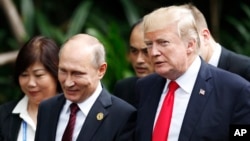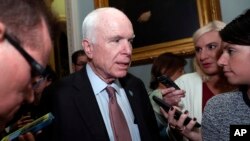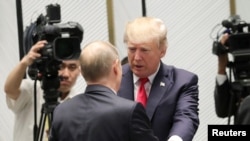Two former U.S. intelligence officials slammed President Trump Sunday for saying believes that Russian President Vladimir Putin "feels that he and Russia did not meddle" in the 2016 U.S. presidential election.
Former CIA director John Brennan, in an appearance on CNN with James Clapper, the former director of national intelligence, said Trump's initial indication that he believed Putin shows "that Donald Trump can be played by foreign leaders who are going to appeal to his ego and try to play upon his insecurities, which is very, very worrisome from a national security standpoint."
Clapper said Russia poses and obvious threat to the U.S., and to suggest otherwise "poses a peril to this country."
Trump was asked Saturday whether the issue of Russian meddling in the 2016 U.S. presidential election came up in conversations with Putin in Vietnam where the two leaders attended an Asia-Pacific summit. Trump replied, “He said he didn't meddle, he said he didn't meddle. I asked him again. You can only ask so many times.”
Trump went on to say, “That whole thing was set up by the Democrats” - slamming former United States intelligence leaders, including Brennan and Clapper.
"They're political hacks. So you look at it, and then you have Brennan, you have Clapper and you have [James] Comey. Comey's proven now to be a liar and he's proven to be a leaker," he said, referring to the FBI's former director, who was fired early in Trump's presidency amid much controversy.
“So you look at that. And you have President Putin very strongly, vehemently says he had nothing to do with that," Trump said.
Taking issue
Trump's remarks brought immediate criticism on Saturday.
In a statement, Sen. John McCain (R-Ariz.), a frequent critic of the president from his own party, said, “There’s nothing ‘America First’ about taking the word of a KGB colonel over that of the American intelligence community. … Vladimir Putin does not have America’s interests at heart. To believe otherwise is not only naive but also places our national security at risk.”
But Rep. Adam Schiff (D-CA), the Ranking Member of the House Permanent Select Committee on Intelligence, said Saturday the president understands the truth about Russian interference, and is simply choosing to "accept" Putin's denials "over the solid evidence of our own intelligence agencies."
“He understands all this and more. He just doesn’t understand how to put country over self. Or to put it in terms he is more familiar with - Mr. Trump simply can’t bring himself to put America first," Schiff said in a statement.
And Gen. Michael Hayden, former director of the National Security Agency (NSA) tweeted Saturday, "So my question is: which is the position of the U.S. government? POTUS or CIA?"
Hayden then tweeted, "CIA just told me: The Dir stands by and has always stood by the January 2017 Intelligence Community Assessment entitled: Assessing Russian Activities and Intentions in Recent U.S. Elections. The intelligence assessment with regard to Russian election meddling has not changed."
On Sunday, President Trump clarified that he meant Putin was sincere when denying that Russia did not meddle in the election.
"As to whether I believe it, I’m with our agencies," Trump said. "As currently led by fine people, I believe very much in our intelligence agencies."
Cooperation with Russia
Trump also reiterated his stance Sunday that "having Russians in a friendly posture, as opposed to always fighting with them, is an asset to the world and an asset to our country, not a liability."
Earlier Sunday, on his Twitter account, the president wrote: "Does the Fake News Media remember when Crooked Hillary Clinton, as Secretary of State, was begging Russia to be our friend with the misspelled reset button. Obama tried also, but he had zero chemistry with Putin."
Trump told reporters on Air Force One as it flew from Danang to the Vietnamese capital of Hanoi Saturday that a joint statement on Syria he agreed to issue with Putin is “going to save a tremendous number of lives.”
The statement, first released by the Kremlin, says the two leaders “confirmed the importance of de-escalation areas as an interim step to reduce violence in Syria, enforce cease-fire agreements, facilitate unhindered humanitarian access, and set the conditions for the ultimate political solution to the conflict.”
It also says that Putin and Trump “agreed to maintain open military channels of communication between military professionals to help ensure the safety of both U.S. and Russian forces and de-confliction of partnered forces engaged in the fight against ISIS.”
‘A very good relationship’
Putin told reporters in Danang Saturday the joint statement is one of extraordinary importance, confirming the principles of the fight against terrorism.
Trump said of the Russian leader “we seem to have a very good feeling for each other, a good relationship considering we don’t know each other well. I think it’s a very good relationship.”
Trump also said the United States could be helped a lot by Russia on the North Korean nuclear issue.
“You know, you are talking about millions and millions of lives. This isn't baby stuff, this is the real deal. And if Russia helped us in addition to China, that problem would go away a lot faster.”
But Trump said, concerning the North Korea nuclear and ballistic missile issue, “I did not speak to President Putin about it, because we just had these little segments where we were talking about Syria.”
Putin, in his remarks to the media, said, “We discussed all we wanted” at the APEC Summit, but unfortunately there was little time to speak in detail. He added that it would be good for Russian and American teams to sit down to talk about the whole breadth of the bilateral relationship.
Putin described Trump as a comfortable person, educated, and said he and the U.S. president were highly civil in their interactions.
RT retribution
The Russian leader warned, however, that action is likely to be taken against U.S. media in response to an American requirement that Russia’s RT media outlet register as a foreign agent in the United States.
Putin termed it an attack on free speech by the U.S. government, and he warned retaliatory measures will be proportionate and reciprocal.
CNN, Radio Free Europe/Radio Liberty and the Voice of America have been mentioned by Russian officials and media reports as the most likely targets of the retaliation.
VOA National Security Correspondent Jeff Seldin and VOA House Correspondent Katherine Gypson contributed to this report.








